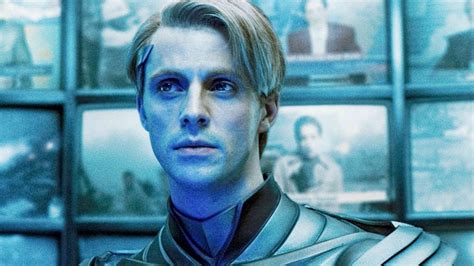Eye For Film >> Movies >> Watchmen (2009) Film Review

"Oh, the times, they are a-changin'", goes Bob Dylan's lyric over the opening credits of Zack Snyder's Watchmen, and it turns out to be true in more ways than one.
Not only is the sequence a dazzlingly economic photomontage of the emergence and eventual dissolution of comicbook-inspired masked vigilantes 'the Minutemen' and their replacement by a second generation of would-be heroes, but it also offers an altered history of the 20th century itself. Jack Kennedy is, in fact, assassinated by the Comedian (Jeffrey Dean Morgan), Andy Warhol produces tinted prints of Nite Owl (Patrick Wilson), the butt-naked, blue-skinned Dr Manhattan (Billy Crudup) is on the moon to film Neil Armstrong's one giant leap for mankind, and Richard Nixon (Robert Wisden) wins a third term in office. These are indeed different times.

Even the graffiti seen scrawled on a wall near the end of the sequence – "Who watches the watchmen?" - has acquired several new layers of meaning. Originally Juvenal penned this Latin slogan in his sixth Satire to refer to the untrustworthiness of slaves assigned to guard the virtue of Roman noblemen's wives - but by the time Alan Moore and Dave Gibbons were writing their now classic 12-issue series Watchmen for DC comics, in 1986-7, Juvenal's line had become a byword for the abuse of political power. Moore was tapping right into anxieties about the lack of political scrutiny and accountability that dominated the Reagan era – and it seems hardly a coincidence that Juvenal's words were also cited as the epigraph of the Tower Commission Report into the Iran-Contra scandal, published in early 1987. Watchmen the comic was very much a phenomenon of its time.
Still, as one of the film's final lines would have it, "Nothing ends, nothing ever ends". Those in power continue to take world-affecting decisions beyond the view of the public, continue to serve their own interests, continue to set ideology above human life, continue to act extra-judiciously and with extreme prejudice – and so, like all great myths, Watchmen has never stopped reflecting the concerns of changing times.
Film rights to the comic were purchased before the series was even completed, and the project has been pushed around ever since, attracting (and then losing) such big-name directors as Terry Gilliam, Darren Aronofsky and Paul Greengrass – but it was certainly not lack of relevance that prevented the film getting greenlit, but rather just the sheer scale and ambition of the source material, not to mention the maniacal fervour of its fanbase.
Now, after proving his technical nous at comicbook adaptations with 300 (2006), Zack Snyder has taken on the Watchmen behemoth, and the result is a sprawling epic of our times – and all times. Sure there is a new, voguish emphasis on fossil fuel depletion, a newly emphatic image of the Twin Towers looming over the cemetery where the recently murdered Comedian is laid to rest, and a new post-9/11 resonance to the climactic scenes of New York devastation – but what is remarkable here is how few tweaks to the original have been required to make the alternative Eighties setting seem a mirror to the socio-political landscape of the real Noughties.
After all, the world has just had to endure two terms of its own neo-con neo-Nixon, vote-rigging and war-mongering his way through the last decade of global terror – and when has there ever been a time when the clock did not seem to be registering five minutes to midnight? In a world of human savagery and cosmic indifference, every day is Doomsday.
That, it turns out, is the main theme of Watchmen, as every character's utopian ideals are shown to have underpinnings that are at best blinkered, if not fascistic, psychotic or inhumanly detached. As rogue vigilante Rorschach (Jackie Earle Haley) investigates the murder of the Comedian and gradually uncovers a plot of apocalyptic proportions, his narration may insist uncompromisingly upon seeing everything in black and white, but a greater truth is written on his face. For the constantly mobile inkblots on his mask that have given him his nom de guerre show that black and white are ever shifting territories, allowing viewers to construct whatever kind of picture they wish.
On the one hand, this film, with its hyperkinetic action, airborne romance and costumed characters, offers a straightforward array of superhero conventions – but at the same time any and every solution these caped crusaders bring represents a further problem, so that they are as much the villains as the heroes of the piece. It all depends on what you want to see – kickass blockbuster or convoluted morality play - and Watchmen has something for everyone.
Aesthetically Watchmen is a real pleasure, and Snyder's use of the source comic as an actual storyboard ensures a remarkable fidelity to the look of the original, as though the illustrated pages were coming to life on the screen (in IMAX clarity, where available). The dialogue, too, is often repeated verbatim, and works surprisingly well in its new medium, its occasional clunkiness excusable as part of the film's overall stylisation.
It is easy to appreciate the purely cinematic motivations that underlie Snyder's decision to expand the comic's few action scenes – but some calmer, wordier, more philosophical episodes have also survived remarkably intact, like Dr Manhattan's otherworldly debate with former girlfriend the Silk Spectre (Malik Akerman) about the relative value of humanity. It is one of the strangest, and most beautiful, sequences in the film.
In many ways Watchmen sets itself up as an easy target for criticism. To begin with, everything in the original comic that seemed so fresh and new, so deconstructive of heroic codes and conventions, has itself become hackneyed in the intervening years. Masked crimefighters' costumes have been explicitly fetishised in cinema from as early as Batman Returns (1992) and Batman Forever (1995), we now entirely expect their morality to be dark and ambiguous, and even the children's film The Incredibles (2004) played out like a parody of a Watchmen film that had not yet been made. What once was original now risks being mere overworked cliché.
Snyder is also lumbered with an unmanageable complexity of plot, subplot and backplot, an ensemble of characters who often seem more like symbolic archetypes than real people, and an army of Watchmen fans who will attack him for even the slightest alteration to their hallowed urtext. And the graphic novel has, inevitably, been altered – even a duration of over two and a half hours is not enough to accommodate every dizzying incident and detail of Moore's story. All the tale-within-a-tale material (chiefly the excerpts from Hollis Mason's Minutemen memoir Under The Hood and the The Tale of the Black Freighter comic) is gone, as well as many individual episodes, while the ending has been modified and simplified (no tentacles!).
None of these changes is terminally destructive to the spirit of the original, and some of them are frankly for the better – but most importantly, the film retains both Moore's elaborate and discomfiting ideas, as well as Gibbons' iconic visuals. The latter are timeless, while the former adapt well to the changing times.
In short, Snyder's reverential adaptation is entertaining, edifying and challenging. With the end of the world as nigh as it ever has been, these Watchmen are well worth watching.
Reviewed on: 28 Feb 2009



















